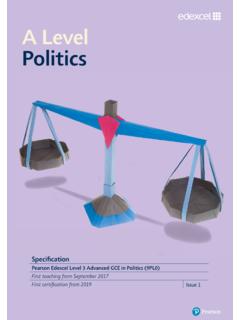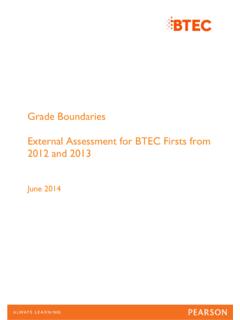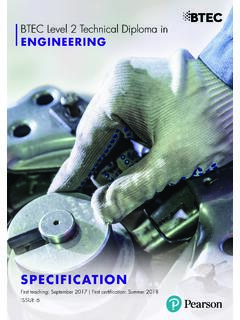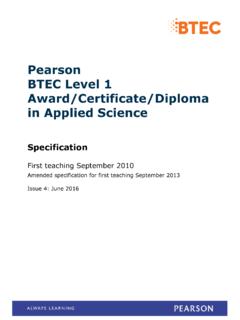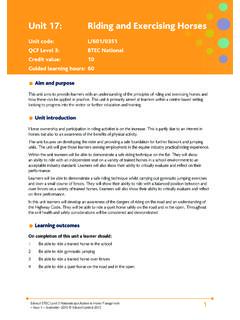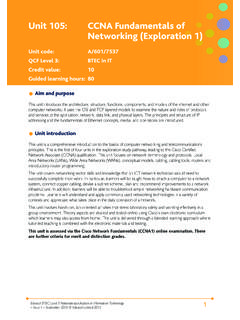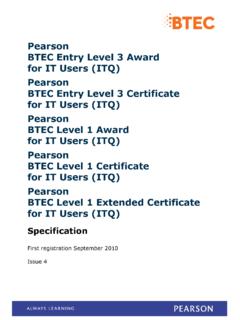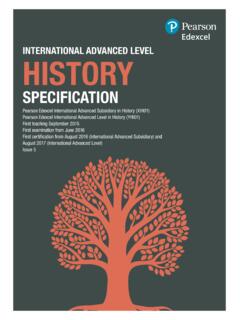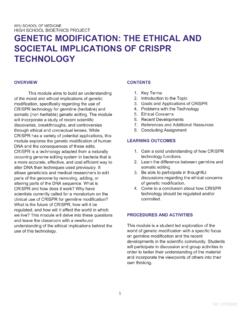Transcription of GCSE (9-1) Biology
1 GCSE (9-1)BiologySpecificationPearson Edexcel Level 1/Level 2 GCSE (9 - 1) in Biology (1BI0)First teaching from September 2016 First certification from 2018 Issue 3 Summary of Pearson Level 1/Level 2 GCSE (9 1) in Biology (1BI0) s pecif ication Issue 3 changes Summary of changes made between previous issue and th is current issue Page number The mapping of the maths skill 3b to content topics , , and has been removed. 22, 23, 28 Head Teacher Declaration Form has been updated. The deadline to complete and submit the Head Teacher Declaration form has been changed from 15th May to 15th April. Also, the form of submission has been changed from email to a website upload.
2 51 If you need further information on these changes or what they mean, contact us via our website at: Contents 1 Introduction 2 Why choose Edexcel GCSE in Biology ? 2 Supporting you in planning and implementing this qualification 3 Qualification at a glance 4 2 Subject content 5 3 Assessment information 33 4 Administration and general information 36 Entries 36 Access arrangements, reasonable adjustments, special consideration and malpractice 36 Student recruitment and progression 39 Appendix 1: Mathematical skills 43 Appendix 2: Taxonomy 45 Appendix 3: Apparatus and techniques 47 Appendix 4: Practical Science Statement 51 Appendix 5: The context for the development of this qualification 52 Appendix 6: Transferable skills 54 Appendix 7: Codes 55 Appendix 8.
3 Calculators 56 Pearson Edexcel Level 1/Level 2 GCSE (9-1) in Biology Specification Issue 3 February 2018 Pearson Education Limited 2018 2 1 Introduction Why choose Edexcel GCSE in Biology ? Supporting success in science Science matters. That s why we ve built the most inclusive GCSE (9 1) courses, so every student can enjoy science and succeed in their studies. Every student is different. With the same science and equal number of exams across our tiered qualifications, you can structure the courses in the ways that mean you can best support and stretch your students together. Our specifications are straightforward, and our selection of core practicals are designed to help bring science learning to life.
4 And when it comes to our assessments, they re shaped to encourage all students to best show what they know and can do. Pearson Edexcel Level 1/Level 2 GCSE (9-1) in Biology Specification Issue 3 February 2018 Pearson Education Limited 2018 3 Supporting you in planning and implementing this qualification Planning Our Getting Started guide gives you an overview of the new GCSE qualifications to help you to get to grips with the changes to content and assessment and to help you understand what these changes mean for you and your students. We will give you editable schemes of work that you can adapt to suit your department.
5 Our mapping documents highlight key differences between the new and 2011 qualifications. Teaching and learning There will be lots of free teaching and learning support to help you deliver the new qualifications, including: a free series of teacher, student and technician worksheets will help cover each element of planning and delivering every core practical a free practical guide to help you prepare for the changes to practical assessment a free maths guide for scientists to help you embed mathematics in your science teaching. Preparing for exams We will also provide a range of resources to help you prepare your students for the assessments, including: additional assessment materials to support formative assessments and mock exams marked exemplars of student work with examiner commentaries.
6 ResultsPlus ResutsPlus provides the most detailed analysis available of your students exam performance. It can help you identify the topics and skills where further learning would benefit your students. Get help and support Our subject advisor service, led by Stephen Nugus and Julius Edwards will ensure you receive help and guidance from us and that you can share ideas and information with other teachers. Learn more at examWizard examWizard is a free exam preparation tool containing a bank of Edexcel GCSE Science exam questions, mark schemes and examiners reports. Existing questions will be reviewed and tagged to our new specifications so they can still be used, and question descriptions will be updated.
7 Pearson Edexcel Level 1/Level 2 GCSE (9-1) in Biology Specification Issue 3 February 2018 Pearson Education Limited 2018 4 Qualification at a glance Content and assessment overview The Pearson Edexcel Level 1/Level 2 GCSE (9 1) in Biology consists of two externally-examined papers. These are available at foundation tier and higher tier. Students must complete all assessments in the same tier. Students must complete all assessment in May/June in any single year. Paper 1 (*Paper code: 1BI0/1F, 1BI0/1H) Written examination: 1 hour and 45 minutes 50% of the qualification 100 marks Content overview Topic 1 Key concepts in Biology Topic 2 Cells and control Topic 3 Genetics Topic 4 Natural selection and genetic modification Topic 5 Health, disease and the development of medicines Assessment overview A mixture of different question styles, including multiple-choice questions, short answer questions, calculations and extended open-response questions.
8 Calculators may be used in the examination. Information on the use of calculators during the examinations for this qualification can be found in Appendix 8: Calculators. Paper 2 (Paper code: 1BI0/2F, 1BI0/2H) Written examination: 1 hour and 45 minutes 50% of the qualification 100 marks Content overview Topic 1 Key concepts in Biology Topic 6 Plant structures and their functions Topic 7 Animal coordination, control and homeostasis Topic 8 Exchange and transport in animals Topic 9 Ecosystems and material cycles Assessment overview A mixture of different question styles, including multiple-choice questions, short answer questions, calculations and extended open-response questions.
9 Calculators may be used in the examination. Information on the use of calculators during the examinations for this qualification can be found in Appendix 8: Calculators. *See Appendix 7: Codes for a description of this code and all other codes relevant to this qualification. Pearson Edexcel Level 1/Level 2 GCSE (9-1) in Biology Specification Issue 3 February 2018 Pearson Education Limited 2018 5 2 Subject content Qualification aims and objectives GCSE study in the sciences provides the foundation for understanding the material world. Scientific understanding is changing our lives and is vital to the world s future prosperity.
10 All students should learn essential aspects of the knowledge, methods, processes and uses of science. They should gain appreciation of how the complex and diverse phenomena of the natural world can be described in terms of a small number of key ideas that relate to the sciences and that are both inter-linked and of universal application. These key ideas include: the use of conceptual models and theories to make sense of the observed diversity of natural phenomena the assumption that every effect has one or more cause that change is driven by differences between different objects and systems when they interact that many such interactions occur over a distance without direct contact that science progresses through a cycle of hypothesis, practical experimentation, observation, theory development and review that quantitative analysis is a central element both of many theories and of scientific methods of inquiry.
